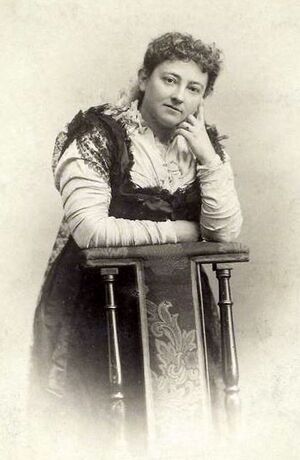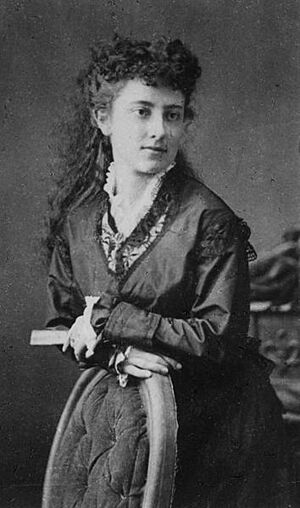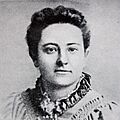Olive Schreiner facts for kids
Quick facts for kids
Olive Schreiner
|
|
|---|---|
 |
|
| Native name |
Olive Emily Albertina Schreiner
|
| Born | 24 March 1855 Wittebergen Reserve, Cape Colony (in present-day Lesotho) |
| Died | 11 December 1920 (aged 65) Wynberg, South Africa |
| Occupation | Novelist, suffragist, political activist |
| Notable works | The Story of an African Farm, Woman and Labour |
| Relatives | Frederick Samuel Schreiner (brother)
William Schreiner (brother) Helen Schreiner (sister) |
| Signature | |
Olive Schreiner (born March 24, 1855 – died December 11, 1920) was a famous South African writer and thinker. She was also a strong supporter of peace and women's rights.
She is best known for her novel The Story of an African Farm (1883). This book was very popular and talked about important ideas for its time. It explored topics like women's dreams, fairness, and life on a farm in colonial South Africa.
Olive Schreiner also spoke up for many groups in South Africa who didn't have political power. These included black Africans, Jewish people, and Indian people. Her ideas were unique and didn't fit into just one group. She believed in moderation, friendship, and understanding among all people. She also developed her own spiritual beliefs, different from her missionary parents' strict religion.
Another important book by Schreiner is From Man To Man Or Perhaps Only (1926). This book was published after she died. It looks at the lives of white women in colonial South Africa. It also explores the struggles of black women and girls during that time.
Contents
A Life of Change: Olive Schreiner's Journey
Olive Schreiner's life had an interesting pattern. She spent her early years in South Africa. Then she lived in England and Europe for several years. After that, she returned to South Africa for a long time. She became more involved in issues like racism and women's rights. Later, she went back to England before returning to South Africa shortly before she died in 1920.
Early Life and Education
Olive Emily Albertina Schreiner was born on March 24, 1855. She was the ninth of twelve children. Her parents were missionaries at a station in the Eastern Cape, South Africa.
Her father, Gottlob Schreiner, was kind but not very practical. This caused financial problems for the family. Her mother, Rebecca, was well-read and taught Olive most of what she knew. Rebecca wanted her children to be disciplined.
When Olive was six, her father lost his job as a missionary. The family became very poor. When she was nine, her younger sister, Helen, died. This deeply affected Olive.
Later, Olive lived with her older brother, Theophilus, in Cradock. She went to his school, which was her first formal education. However, Olive had already started to question her parents' strict Christian beliefs. This led to many arguments with her religious siblings.
Becoming a Governess and a Writer
Because of these disagreements, Olive decided to become a governess. This meant she would teach children in other families' homes. On her way to her first job, she met Willie Bertram. He shared her views on religion and lent her a book that greatly influenced her. This book helped her develop her own ideas about morality, separate from organized religion.
Olive moved from job to job, often leaving because of disagreements with her employers. Her different religious views were often a problem. During this time, she started writing seriously. She began working on a novel called Undine.
Her family's money problems continued, so Olive had to keep working. She took jobs as a governess on several farms. These experiences inspired parts of her famous novel, The Story of an African Farm. She published this book under the pen name "Ralph Iron." She also published a collection of stories called Dream Life and Real Life.
Moving to England and Europe
Olive Schreiner had always wanted to be a doctor. But she didn't have enough money for the training. So, she decided to become a nurse instead. In 1880, she saved enough money to travel to England.
She arrived in England in 1881. However, her poor health prevented her from becoming a nurse or doctor. She realized that writing would be her main work in life.
Her book, The Story of an African Farm, was praised for discussing important issues of the time. These included women's rights and religious doubts. The book also led to a lasting friendship with Havelock Ellis, a famous scientist.
Olive met Ellis in 1884 at a meeting for people who discussed new ideas. She joined several groups that talked about politics and philosophy. She met many important thinkers and socialists. She strongly believed in equality for women. She also felt it was important to consider both men and women when looking at gender relationships.
In 1886, she left England and traveled through Switzerland, France, and Italy. During this time, she wrote a lot. She worked on From Man to Man and published many allegories (stories with a hidden meaning). She also wrote an introduction to Mary Wollstonecraft's book, A Vindication of the Rights of Women.
Returning to South Africa
Olive Schreiner returned to Cape Town, South Africa, in 1889. She felt a strong connection to the land. She became very involved in local politics. She wrote articles about the land and its people, which were later published as Thoughts on South Africa. Through her political work, she became close friends with Emily Hobhouse and Elizabeth Maria Molteno. They were important women activists who shared her views on civil and women's rights.
She became friends with Cecil John Rhodes, a powerful politician. But she soon became disappointed with him. She wrote a critical story about him called Trooper Peter Halket of Mashonaland. Her disappointment grew when he supported a law that allowed black and mixed-race servants to be whipped for small mistakes.
Her opposition to this law connected her with Samuel Cronwright, a farmer who was also active in politics. They shared similar views, and Olive soon fell in love with him. They married in 1894.
The next few years were difficult. Olive's health worsened, and they had to move often. Her only child, a daughter, died shortly after birth. Despite this, she found comfort in her work. She published a pamphlet with her husband about the political situation in 1896. The next year, she published Trooper Peter Halket of Mashonaland.
In 1898, they moved to Johannesburg for health reasons. As war between the Boers and the British seemed likely, Olive tried to prevent it. She wrote The South African Question by an English South African to show the English public the truth of the situation. Her efforts were not successful, and the Anglo-Boer War began.
Throughout the war, she continued to support the Boers and argue for peace. She also started working on her book Woman and Labour. This book expresses her strong beliefs in socialism and gender equality. During the war, she lived in a small town called Hanover.
In her later years, Olive Schreiner continued to be involved in politics. She wanted to help shape a new constitution for South Africa. In her work Closer Union, she argued for more rights for both black people and women. She also joined the Women's Enfranchisement League in 1907. She became its vice-president. However, she stopped supporting it when other branches wanted to exclude black women from voting.
Final Years
When Woman and Labour was published in 1911, Olive Schreiner was very ill. Her asthma was worse, and she had heart problems. In 1913, she sailed to England for treatment. But she was stuck there when World War I began.
During the war, she focused on pacifism, which means working for peace. She was in touch with Gandhi and other peace activists. She started a book about war, which was later published as The Dawn of Civilisation. This was her last book.
After the war, she returned to South Africa. She died in her sleep in 1920. She was first buried in Kimberley. Later, after her husband died, her body was moved. She, her baby, her dog, and her husband were reburied together on top of Buffelskop mountain in the Eastern Cape.
Selected Works
- The Story of an African Farm, 1883 (as "Ralph Iron")
- Dreams, 1890
- Dream Life and Real Life, 1893
- The Political Situation in Cape Colony, 1895 (with S. C. Cronwright-Schreiner)
- Three dreams in a desert. Under a mimosa-tree, 1897
- Trooper Peter Halket of Mashonaland, 1897
- The South African question. By an English South African, 1899
- An English South African Woman's View of the Situation, a critique on the Transvaal difficulty from the pro-Boer position, 1899
- So Here Then are Dreams, 1901
- A Letter on the Jew, 1906
- Closer Union: a Letter on South African Union and the Principles of Government, 1909
- Woman and Labour, 1911
- Woman and war, 1914
- Who Knocks at the Door?, 1918
- The Dawn of Civilisation, 1921
- Thoughts on South Africa, 1923. Published after her death.
- Stories, Dreams and Allegories, 1923. Published after her death.
- From Man to Man Or Perhaps Only ..., 1926. Published after her death.
- Undine, 1929. Published after her death.
Olive Schreiner's Letters Online
The Olive Schreiner Letters Online is a huge collection of over 5,000 letters. These letters were either written by Olive Schreiner or sent to her. They cover many different topics, like South African politics, women writers, social movements, and feminist ideas. This online collection helps researchers learn more about her life and thoughts.
Audio Books
- Story of an African Farm
Images for kids
See also
 In Spanish: Olive Schreiner para niños
In Spanish: Olive Schreiner para niños
- Olive Schreiner Prize - an award named in her honour
- Heretics, a collection of essays by G.K. Chesterton published in 1905, who praises her as "a fierce, brilliant, and realistic novelist... Her literary kinship is with the pessimistic fiction of the continent; with the novelists whose very pity is cruel. Olive Schreiner is the one English colonial who is not conventional" in his diatribe on English Colonization.
 | Frances Mary Albrier |
 | Whitney Young |
 | Muhammad Ali |




